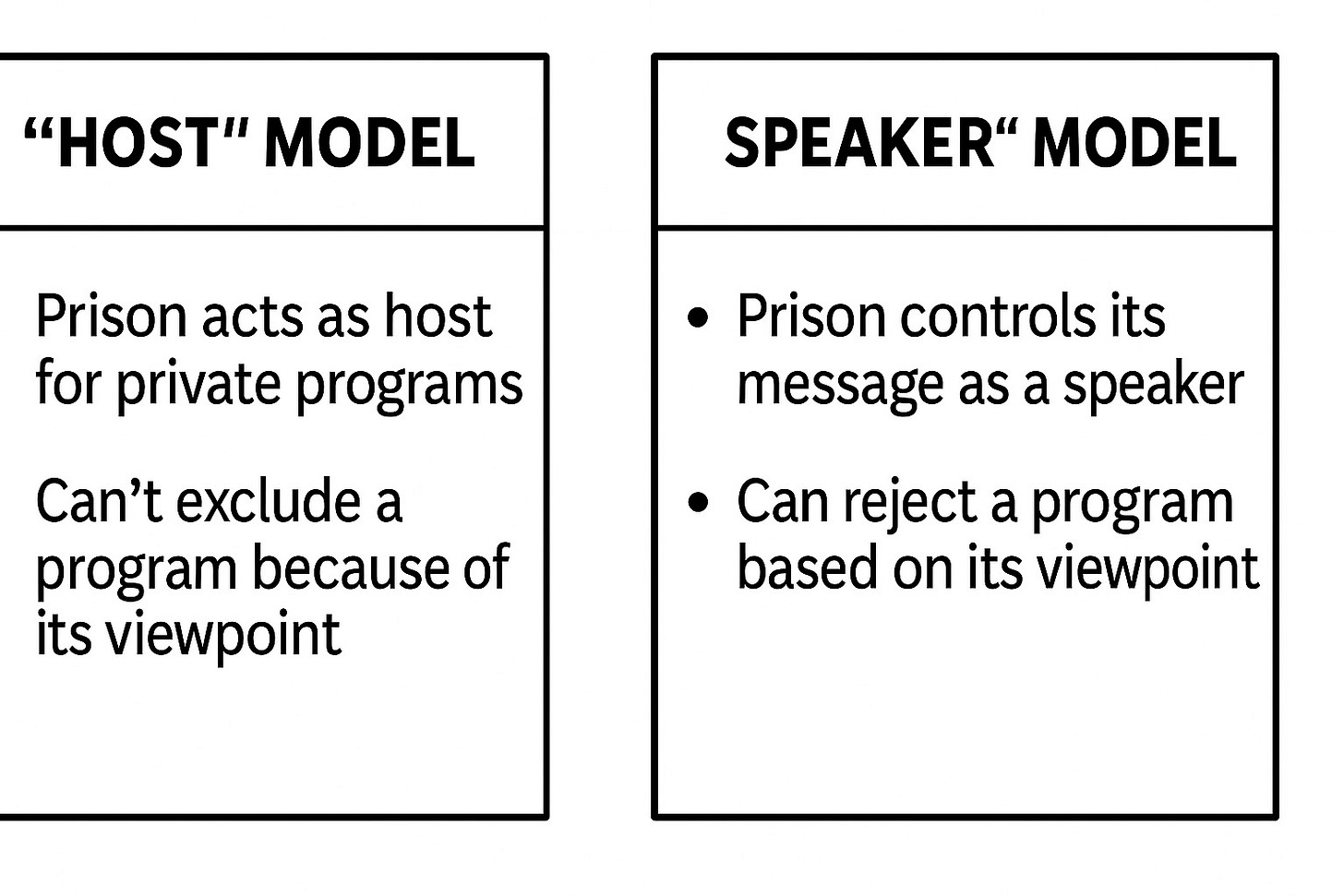On August 14, 2025, the U.S. Court of Appeals for the Eighth Circuit reversed a Minnesota federal judge’s denial of a preliminary injunction and ordered the Minnesota Department of Corrections (MDOC) to reinstate the “Quest for Authentic Manhood” program at the Minnesota Correctional Facility–St. Cloud, pending full resolution of the case.
What This Means (Plain Language)
This case is about whether the prison is acting like a host or a speaker. If it’s acting like a host—letting private groups bring in their own programs—then it can’t exclude a program just because it disagrees with the viewpoint. That’s what the majority says happened here: MDOC let outside volunteers teach programs but shut down Quest because of its religious approach, which is viewpoint discrimination.
If, on the other hand, the prison is acting like the speaker—deciding exactly what message it wants to send to inmates through its official rehabilitative programs—then it has the right to control the content, even to the point of rejecting certain viewpoints. That’s the dissent’s position: prison programming is part of the state’s own message, so it can choose not to include Quest without violating the First Amendment.
The appeals court didn’t settle that bigger question yet. It only decided that, for now, the program goes back in while the lawsuit continues. The final decision at trial will likely turn on whether the court agrees with the “host” model or the “speaker” model.
Anthony Schmitt, a volunteer since 2012, taught Quest, a 24-part Christian video course defining manhood through biblical principles. MDOC terminated the program in 2023, citing conflicts with diversity, equity, and inclusion values and objecting to its treatment of gender roles and sexuality. Schmitt sued, claiming violations of his First Amendment rights.
The district court had applied the deferential Turner v. Safley standard, finding MDOC’s decision reasonably related to rehabilitation. The Eighth Circuit, however, held that the termination was not “neutral” because it targeted Schmitt’s religious viewpoint, amounting to viewpoint discrimination that failed Turner’s threshold requirement. Because the program was excluded based on its religious framing of masculinity, the court found Schmitt likely to succeed on the merits and determined the other injunction factors weighed in his favor, noting that loss of First Amendment freedoms constitutes irreparable harm. It remanded with instructions to order Quest’s reinstatement until the case is decided on the merits.
Judge Jane Kelly dissented, sharply diverging from the majority’s view of the case. She argued that prison rehabilitative programming should be considered government speech, which allows the state to select and shape its content without being bound by the First Amendment’s viewpoint neutrality requirement in the same way as a public forum. Kelly compared the situation to public school curricula, noting that Minnesota law gives the Corrections Commissioner exclusive responsibility for developing programming. Because the state retains control, she saw MDOC’s decision to remove Quest as an exercise of its prerogative to choose programming it believes best serves rehabilitation goals. While the majority emphasized viewpoint discrimination, the dissent stressed that Schmitt could still share Quest’s religious content through alternative channels, such as individual correspondence or chaplain-led services. Kelly gave deference to prison administrators’ assessment that Quest’s teachings could hinder rehabilitation, particularly for inmates with histories involving gender-based violence, and concluded that this was not the rare case warranting judicial override of prison discretion at the preliminary injunction stage.
A full trial on the merits will determine whether Quest can remain in the prison permanently.
Legal Commentary
At the core of this dispute is a clash between two major constitutional doctrines: viewpoint discrimination and government speech.
The majority’s approach starts with Turner v. Safley, which governs prison restrictions that affect constitutional rights. Under Turner, a prison policy must first have a rational connection to a legitimate and neutral government interest before courts weigh the other factors. Here, the majority concluded that MDOC’s decision failed the neutrality requirement because it singled out a religious perspective on masculinity as the reason for exclusion. By identifying the “biblical lens” as objectionable, the department targeted a viewpoint, and viewpoint discrimination is virtually always prohibited under the First Amendment, whether the speaker is inside or outside prison walls. Once the majority found that lack of neutrality, Turner’s test could not be satisfied, and Schmitt’s likelihood of success on the merits became strong.
The dissent’s analysis takes a different route. If rehabilitative programming is deemed government speech, the First Amendment’s viewpoint neutrality rule does not apply in the same way. Government speech doctrine recognizes that when the state speaks for itself, it can promote its own message and decline to promote others. Public school curricula, government advertising campaigns, and state monuments are examples where courts have upheld this control. If MDOC’s programming is government speech, then choosing to remove Quest would be no different than a school choosing to exclude certain materials from its lesson plans.
This difference in framing is critical. If the case proceeds on the majority’s terms, the question will be whether MDOC’s viewpoint-based reasoning can ever be justified under the First Amendment in the prison context—a high hurdle. If it proceeds on the dissent’s terms, the court may decide MDOC had complete discretion to accept or reject programming, with limited constitutional constraints.
The practical effect of this ruling, for now, is that MDOC must reinstate Quest until the case is fully decided. At trial, both sides will likely present extensive evidence: Schmitt to show Quest is religious expression wrongfully excluded, MDOC to argue that it is simply deciding what its official rehabilitative message should be. The court’s final resolution will depend heavily on whether it views prison programming as a forum for private speech or as the government’s own message.
Link to decision: https://ecf.ca8.uscourts.gov/opndir/25/08/242707P.pdf
AI Disclaimer: This summary was prepared with the assistance of artificial intelligence and is based solely on the court document provided.
Tags: First Amendment, prison programming, Eighth Circuit, Minnesota Department of Corrections, religious freedom
